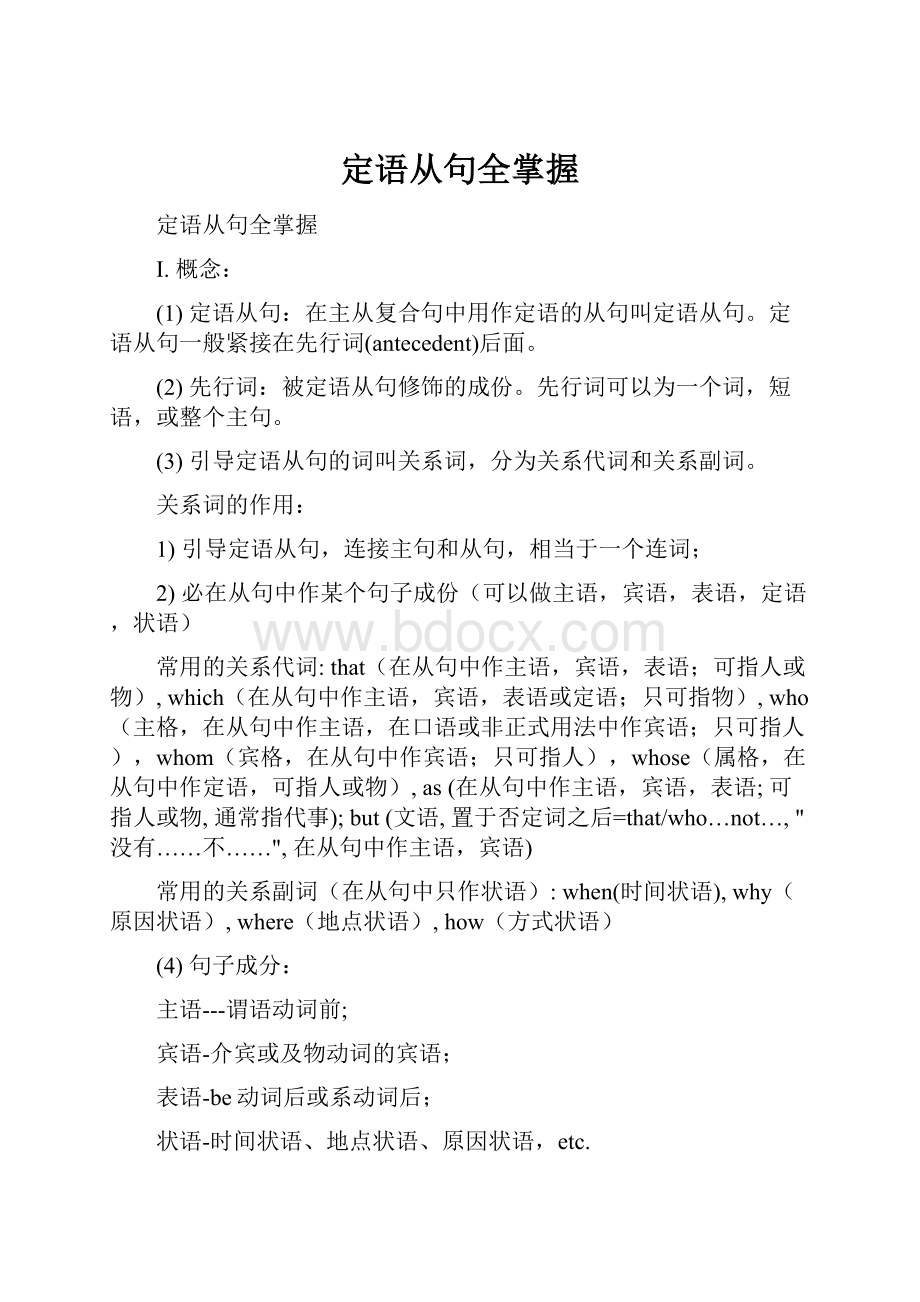定语从句全掌握.docx
《定语从句全掌握.docx》由会员分享,可在线阅读,更多相关《定语从句全掌握.docx(18页珍藏版)》请在冰豆网上搜索。

定语从句全掌握
定语从句全掌握
Ⅰ.概念:
(1)定语从句:
在主从复合句中用作定语的从句叫定语从句。
定语从句一般紧接在先行词(antecedent)后面。
(2)先行词:
被定语从句修饰的成份。
先行词可以为一个词,短语,或整个主句。
(3)引导定语从句的词叫关系词,分为关系代词和关系副词。
关系词的作用:
1)引导定语从句,连接主句和从句,相当于一个连词;
2)必在从句中作某个句子成份(可以做主语,宾语,表语,定语,状语)
常用的关系代词:
that(在从句中作主语,宾语,表语;可指人或物),which(在从句中作主语,宾语,表语或定语;只可指物),who(主格,在从句中作主语,在口语或非正式用法中作宾语;只可指人),whom(宾格,在从句中作宾语;只可指人),whose(属格,在从句中作定语,可指人或物),as(在从句中作主语,宾语,表语;可指人或物,通常指代事);but(文语,置于否定词之后=that/who…not…,"没有……不……",在从句中作主语,宾语)
常用的关系副词(在从句中只作状语):
when(时间状语),why(原因状语),where(地点状语),how(方式状语)
(4)句子成分:
主语---谓语动词前;
宾语-介宾或及物动词的宾语;
表语-be动词后或系动词后;
状语-时间状语、地点状语、原因状语,etc.
例如:
1.ThestudentwhoansweredthequestionwasJohn.(Who做关系代词引导定语从句,修饰先行词student,who在从句中用作主语.)
2.Iknowthereasonwhyhewassoangry.(Why做关系副词,修饰先行词reason,why在从句中作原因状语.)
3.Theboy(whom)youaretalkingtoismybrother.(Whom做关系代词,修饰先行词boy,whom在从句中作宾语.)
4.I'dlikearoomwhosewindowlooksoutoverthesea.(Whose做关系代词,修饰先行词room,whose在从句中用作定语,可代之以ofwhich)
定语从句三步:
第一找出先行词;
第二看先行词在定语从句中的语法功能(做主语、宾语或状语);
第三选择合适的关系词。
Ⅱ.几个关系代词的基本用法:
一、that:
可指人或物;在定语从句中作主语,宾语,表语。
(指人时,相当于who或whom;指物时,相当于which)(一般不用于非限制性定语从句;不可置于介词后作宾语)如:
1.Aletterthat/whichiswritteninpencilisdifficulttoread.(主语)
2.Doyouknowthegentlemanthat/whospokejustnow?
3.Youcantakeanything(that)youlike.(宾语)
4.Whatisthequestion(that/which)theyaretalkingabout?
5.Hereistheman(who/whom/that)youwanttosee.
6.She'snolongerthegirl(that)sheusedtobebefore.(表语)
7.Ourhometownisnolongertheone(that)itusedtobe.=Ourhometownisnotthesameasitusedtobe.=Ourhometownisdifferentfromwhatitusedtobe.=Ourhometownisnotwhatitusedtobe.
二、which:
指物;在定语从句中作主语,宾语,表语,定语。
如:
1.Thebookwhich/thatwasonthedeskwasboughtbymyfather.(主语)
2.Thebook(which/that)Iboughtyesterdayisveryinteresting.(宾语)
3.Thefactoryinwhichhisfatherworksisfarfromhere.
4.Hewasproud,whichhisbrotherneverwas.(表语)
5.Tomspentfouryearsincollege,duringwhichtimehelearnedFrench.(定语)
6.Hemaybelate,inwhichcaseweoughttowaitforhim.
三、who,whom,whose:
who:
主格,在从句中作主语,在口语或非正式用法中作宾语;只可指人
whom:
宾格,在从句中作宾语;只可指人
whose:
属格,在从句中作定语,可指人也可指物。
1.Ilikethestudentswho/thatworkhard.(主语)
2.Allwhoheardthestorywereamazed.(代词如he,they,any,those,all,one等后多用who.)
3.Chaplin,forwhomlifehadoncebeenveryhard,wasasuccessasanactor.(宾语)
4.He’samanfromwhomweshouldlearn.=He'saman(whom/who/that)weshouldlearnfrom.
比较:
Heisthestudentwhomyouthinktobeworthyofyourpraise.
Heisthestudentwhoyouthinkisworthpraising.
5.Achildwhoseparentsaredeadiscalledanorphan.(指人)
I'dlikearoomwhosewindowfacessouth.(指物)=I'dlikearoomofwhichthewindowfacessouth.=I'dlikearoomthewindowofwhichfacessouth.
ThereisateapotshapedlikeaChineseduck,outofwhosemouthteaissupposedtocome
关系代词作介词宾语:
关系代词在定语从句中用作介词宾语时,介词可放于从句之首,也可放于从句之末.但以放于句首较为正式.(介词前置,必须注意不影响动词词组的含义。
关系代词who和that用作介词宾语时,介词必须放在句末.)如:
1.Thisisthebookforwhichyouasked.
=Thisisthebook(that/which)youaskedfor.
2.DoyouknowthepersonwithwhomIshookhands?
=Doyouknowtheperson(whom/who/that)Ishookhandswith?
3.Thebeginningofagriculturewasabigstepinhumanprogresswithwhichnothingcouldcompareuntilourinformationage.
4.Inthedarkstreet,therewasn'tasinglepersontowhomshecouldturnforhelp.
Isthisthefactorytowhichyoupaidavisitlastweek?
Isthisfactorytheonetowhichyoupaidavisitlastweek?
5.Thisisthegirlwhomtheyarelookingafter.(介词after与look构成固定词组,不可前置。
再如:
lookat,lookfor,lookafter,takecareof等)
四、as的用法:
(as引导定语从句,在定语从句中作主语、宾语、表语)
(1)如为限制性的,多用于thesame…as;thesameas;such…as…;asmany/muchas;so…as等结构中。
如:
1.Ihavethesamebookasyou(have).我有一本和你的一样的书。
Herattitudetohimwasquitethesameasithadalwaysbeen.(关系代词as和指示代词same连用,在从句中用作表语,先行词是same.)
2.---Whydidn'tyoumentionthatinfaceofthepolicejustnow?
---Ithoughtitwassuchaminordetailaswashardlyworthmentioning.
Wewillonlydiscusssuchproblemsashavesomethingtodowithourowninterests.
Don'tdosuchthingsasyouarenotsureabout.
Thereisnosuchplaceasyoudreamofinallthisworld.
比较:
Iliveinthesamehousethatheusedtolivein.
I'mwearingthesameshirtasyouworeyesterday.
比较:
Hereissobigastoneasnoonecanlift.(定语从句)
Hereissobigastonethatnoonecanliftit.(结果状语从句)
(2)如为非限制性的,多单独引导一个定语从句,这种定语从句可置于句首,句中或句尾,译为"正如,这一点"。
(动词常为know,see,expect,pointout,etc.)
1.Asweallknow,smokingisharmfultoone'shealth.(as作宾语)
=Asisknowntoall,smokingisharmfultoone'shealth.(as作主语)
=It'sknowntoallthatsmokingisharmfultoone'shealth.
或:
Smokingisharmfultoone'shealth,asweallknow.(as作宾语)
或:
Smoking,asweallknow,isharmfultoone'health.
2.Hewasaforeigner,asIknewfromhisaccent.(宾语,先行词是前面整个句子)
五、but的用法:
but用作关系代词,其意思相当于who/that…not…,"没有……不……",如:
1.Thereisnotoneofusbutwishestohelpyou.
2.Thereisnotreebutbearssomefruit.
3.Thereareveryfewbutadmirehistalents.
Ⅲ.关系副词引导的定语从句:
When指时间,在定语从句中作时间状语。
其先行词是表时间的名词(如:
time,day,week,tear,month,etc.)
1.HecamelastnightwhenIwasout.
2.Wewillputoffthepicnicuntilnextweek,whentheweatherwouldbebetter.
注意:
先行词为"时间名词",可用when引导定语从句,when在定语从句中作状语;还可以用which或that引导,which或that在从句中作主语或宾语。
比较:
1.Istillrememberthedaywhen/onwhichmybrotherjoinedthearmy.(作状语)
Nextmonth,whenyouwillbeinyourhometown,isjustaroundthecorner.
2.Istillrememberthedayswhich/thatwespenttogether.(作宾语)
Nextwinterwhich/thatyou'llspendinHarbin,I'msure,willbeexciting.
3.IshallneverforgetthedaywhenShenZhouⅤwaslaunched,whichhasagreateffectonmylife.
Thereareoccasionswhenjokingisnotpermissible.
Where指地点,在定语从句中作地点状语。
其先行词是表示地点的名词,如:
place,school,factory,room,etc.如:
1.ThisistheplacewhereIwasborn.
2.Iliveintheroomwhere/inwhichheusedtolive.
注意:
先行词是"地点名词",定语从句可用where引导,还可用which或that引导,which/that在从句中作主语或宾语。
比较:
1.Thisisthefactorywhere/inwhichheworkedlastyear.(作状语)
Thetreatmentwillcontinueuntilthepatientreachesthepointwherehecanwalkcorrectlyandsafely.
Ithinkyouhavegottothepointwhereachangeisneeded,oryouwouldfail.
Governmentreports,legalpapersandmostbusinesslettersarethemainsituationswhereEnglishisused.
He'sgothimselfintoadangeroussituationwherehe'slikelytolosecontroloftheplane.
Thesmallmountainvillagewherewespentourholidaylastmonthliesinwhat/theplacewhichisnowpartofHubei.
2.Thisistheparkwhich/thattheyvisitedlastyear.(作宾语)
Nothavingbeentherebefore,hesimplyhadnoideaabouttheplace,whicheveryonesaysisworthvisiting.
Why指原因,在定语从句中作原因状语。
先行词为reason时,可用forwhich指代;当关系词在从句中作主语或宾语时,则用which或that引导。
如:
1.Thereasonwhy/forwhich/(that)hedidn'tattendthemeetingwasthathewasill.(作状语)
2.Idon'tbelievethereason(that/which)hegaveme.(作宾语)
Haveyouaskedhimthereasonthatmayexplainhissuccess?
(作主语)
Ex.)Hewaslate.That'sbecausehegotuplate.
.Hegotuplate.That'swhyhewaslate.(表语从句)
(thereason)why/forwhichhewaslate.(定语从句)
当先行词为way时,定语从句常用that,inwhich,或how引导,that常可以省略。
way后的定语从句的引导词不用时较多。
但如果关系词在句中作主语或宾语
时,则用which或that引导。
如:
1.Thisistheway(that)/inwhichIdosuchthings.
比较:
Pleasedotheexperimentintheway(that/which)Ihaveshownyou.
Ⅳ.限制性定语从句与非限制性定语从句的区别:
1.形式上,非限制性定语从句往往用逗号隔开。
2.语法上,非限制性定语从句一般不用that.
3.语义上,限制性定语从句与先行词关系紧密,起限定作用,如果去掉了这个定语从句,整个句子就不完整或者会改变意思;而非限制性定语从句与先行词关系不是很紧密,对先行词起补充说明或描述的作用。
1).ThisisthebookIlikebest.这就是我最喜欢的那本书。
2).Beijing,whichhasbeenChina'scapitalformorethan800years,isrichinculturalandhistoricrelics.北京是中国八百年之久的古都,它有着丰富的文化和历史遗产。
4.翻译时,限制性定语从句可译为一句(较短的一般译为"的"字结构);而非限制性定语从句可译为两句。
(见上句翻译)
比较:
Hehasasister,whoisamusician.
Hehasasisterwhoisamusician.
引导非限制性定语从句的关系代词,指人时用who,whom,whose,指物时用which,whose;关系副词when,where,why,etc.
1.Hestudiedhardatschoolwhenhewasyoung,whichleadstohissuccessinhislaterlife.
2.Tom'sfather,whoarrivedjustnow,isafamousscientist.
3.Theysetupaseparatestateoftheirown,wheretheywouldbefreetokeepNegroesasslaves.
4.Hewasproud,whichhisbrotherneverwas.
Ⅴ.几个易混淆的关系代词的比较:
(A)that&which:
在定语从句中,which和that在指代事物时,一般可以互换使用,但并非在任何情况下都是这样,这里介绍宜用that,而不宜用which的情况.
(1)先行词为不定代词,如all,much,something,everything,anything,nothing,none,theone等。
如:
1.Weshoulddoallthatisusefultothepeople.
2.There’snothingthatcanbesaidaboutit.
3.Doyoumeantheonethatwasboughtyesterday?
(2)先行词被only,any,few,little,no,just,very,oneof等词修饰时。
如:
1.Theonlythingthatwecoulddowastowait.
2.That’stheverywordthatiswronglyused.
3.Thelastplace(that)wevisitedwasthechemicalworks.
4.Youcantakeany(=whichever)seatthatisfree.
5.IhopethelittlethatIcanwillbeofsomehelptothem.
6.比较*Thisisoneofthebestnovelsthatwerepublishedlastyear.
*Thisistheonlyoneofthebestnovelsthatwaspublishedlastyear.
(3)先行词是序数词时或被序数词修饰时。
如:
1.WhenwetalkaboutWuxi,thefirstthatcomesintomindisTaiLake.
2.Thisisthethirdfilmthathasbeenshowninourschoolthisterm.
(4)先行词是最高级或被最高级修饰时。
如:
1.Thisisthebestthatcanbedonenow.
2.Themostimportantthingthatshouldbedonerightnowishowtostophimfromgoingon.
(5)先行词既有人又有物,用which和who都不适合,这时宜用that.如:
1.Thewriterandhisnovelthatyouhavejusttalkedaboutisreallywellknown.
2.Theriderandhisbikethathadrunoveranoldwomanwereheldupbythepolice.
(6)被修饰词为数词时.如:
1.YesterdayIcaughttwo